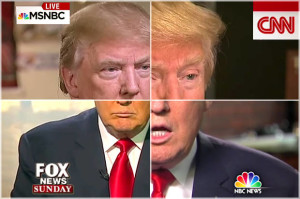Wednesday, November 30th, 2016
Stephan: In the late 80s I had lunch with Vladimir Pozner, who at the time was the public face of the Soviet Uni0n explaining on Ted Koppel's Nightline what was going on as Communism and the Soviet Union came to an end. We were at the Writer's Club, and I asked him about press censorship. He leaned towards me and with a knowing smile said, "You don't get it; the Western Press just doesn't get it; not yet anyway. There's censorship in certain areas, sure, but there is censorship in certain areas of American society. That's not the problem." I have to be honest I did not know what he meant. Then he continued, "the problem is self-censorship. Over here it's you might not get that desirable apartment, in the U.S. it would be you won't get access, either professionally or socially. The biggest threat to a free press is self-censorship. Either way the story doesn't get covered, or gets softened." It was a teaching moment. And now we have another factor that is undermining a free press in the United States: Abuse of the legal system by the ultra-rich.
If you have five or ten or more billions, and a reporter seriously pisses you off what's a million dollars spent legally beating that person up, maybe breaking them financially? The effect on a functional fourth estate will be devastating and will inevitably lead to self-censorship -- Do I really need to get into this fight reporters will ask?
W

Credit: Salon
ealthy Americans like Donald Trump have increasingly used the courts to punish their media critics — and the threat they pose to press freedoms will only grow worse with his election.
The president-elect vaguely promised during his campaign to “open up libel laws” to weaken legal safeguards for writers and publishers, but public animosity against the press has already changed the dynamic in those cases, reported Emily Bazelon for the New York Times Magazine.
A jury awarded $140 million in March to former pro wrester Hulk Hogan, who sued the website Gawker over the publication of a sex tape, and one of the jurors said they used the case to make “an example in society and other media organizations.”
The News & Observer lost a libel suit in September filed by a former North Carolina ballistics agent and jurors ordered the newspaper to pay $9 million in damages, although the penalty exceeds the state’s cap of $6 million.
Bazelon points out that Britain’s standard of proof in libel cases is lower than in the U.S., but […]












When we actually have a functioning Fourth Estate then freedom of the press will be important.
For now a handful of global media corporations own most everything and they mostly produce entertainment and propaganda.
What happened during the election does not deserve to be called journalism.
All the alternate media that the Washington Post hates are the closest things we have to freedom of the press.
Mr. Hovland expressed my very thoughts better than I could. Well said! I second all four of his assertions.